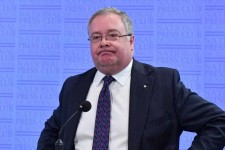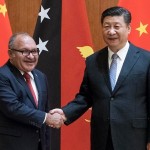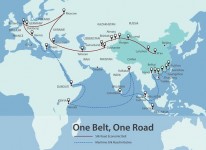The Victorian state government has released the details of a controversial agreement with China on its Belt and Road initiative.
It seeks to revive the ancient road and ocean network by creating two modern transit and trade corridors between China and Europe.
What is China's Belt and Road Initiative?
Now, a memorandum of understanding between China and Victoria has been released, showing an agreement made by the two parties linking the state to the initiative.
The release comes more than a month after the secretive deal was signed on October 8.
When it was later announced at a formal ceremony on October 25, Victorian Premier Daniel Andrews said the agreement would benefit Victorians.

“If we can, through the infrastructure work that China is involved in offshore, if we can be exporting skills as well as giving businesses the opportunities to share in all that work, then I think that's a good thing.”
Australia’s policy
The Chinese government has already spent billions of dollars on new infrastructure projects for roads, railways, ports and maritime corridors.
Sixty-eight countries have so far signed up to the project, including New Zealand.
However, the federal government has decided Australia will not take part due to concerns over China's plans to expand its power in the region and beyond.
The Australian Strategic Policy Institute's Executive Director Peter Jennings is concerned about what China's plans really are.
“China knew, very well, that the federal position was not to sign an MOU,” Mr Jennings told SBS News.
“So by [China] going to the Victorian state government, I really think that what we have is Beijing shopping around to find an answer that it prefers. And frankly, this amounts to a type of interference in Australia's political system.”
‘A secret deal’
Mr Andrews had been resisting calls from Prime Minister Scott Morrison and Victoria's opposition leader Matthew Guy to make the deal public before the November 24 election.
Early last week, Mr Morrison also insisted Australia would maintain its policy on the Belt and Road Initiative and, rather than sign a deal, it would address any plans on a case-by-case basis.
The Liberal party's state treasury spokesman Michael O'Brien accused Mr Andrews of overstepping his powers.
He told SBS News that he thinks “it was a mistake, frankly, for the Victorian government to sign up to this.”
“The Australian government clearly had concerns that such a deal would not be in the best interests of Australia. So Victorians are entitled to ask: 'Why does Daniel Andrews think he knows better than the federal government which has got advice from trade agencies and security agencies?’
“Daniel Andrews has absolutely put Victoria if, not at risk, then certainly under a big question mark because of the secrecy with which he's done this deal,” Mr O’Brien said.
Peter Jennings said state governments shouldn’t be dealing in foreign policy.
“Section 51 of the constitution sets out the roles and responsibilities of the federal government and that includes trade, foreign affairs, defence and a bunch of other activities. But frankly a number of things that are canvassed in the MOU are really constitutionally the responsibility of the federal government,” Mr Jennings told SBS News.
'Unique situation'
Hussain Rammal is an Associate Professor of of International Business and Strategy at the University of Technology Sydney.
Professor Hussain Rammal said in the past, such deals have been at a “country-to-country level”.
"We haven't seen a state and a country saying we will go ahead with China, so this is certainly a unique situation - the first of its kind as far as this one belt - one road initiative is concerned, Professor Rammal told SBS News.
“Australia wasn't very keen, even though it's in the neighbourhood, Australia is happy to have Chinese investment, but it wasn't going to have the country be part of this initiative. So, the Victorian government doing that will certainly raise some eyebrows around the world, but it does create a bit of tension or conflict with the federal government.”
Mr Jennings welcomed the memorandum’s release but questioned the timing.
“I think the whole thing has been handled very badly. So the document appears to have been signed on the 8th of October but it took weeks before it was announced. Then for a period of weeks, Premier Andrews refused to release it and said that it was secret and not possible to be put out. Then it’s released late on a Sunday afternoon of Armistice Day, when frankly a lot of people are putting their attention elsewhere.”
Premier Daniel Andrews told SBS News that the government was going to release the details on Friday, but that was cancelled due to the Bourke Street terror attack.
More trade and jobs
Victoria's economic prosperity relies strongly on its relationship with China, with China being Victoria's largest trading partner.
Victoria is a large provider of food and fibre products to China, and China is Victoria's largest source of international students and tourists.
While the deal may benefit Victoria's economy, Mr Jennings urged the state government to rethink the agreement.
"People can do silly things when they think that big money is on the line.
"It's often a sense of greed that drives how state governments want to engage with China and usually the eagerness to line up for the cash is such that they perhaps overlook some of the finer details about how to negotiate agreements to protect ones interests.
“Nothing is as simple as it seems when it comes to negotiating with China.”
The Chinese government has been criticised for burdening some developing economies with large debts after they've signed up to the initiative.
While it’s not a legally binding contract, Mr Jennings had concerns over Victoria becoming another casualty to the BRI.
Mr Jennings said Sri Lanka had become an early casualty of a BRI deal with China over the construction of a port.
“In the Sri Lankan case, the Chinese essentially lent the Sri Lankan government money to construct the port and then the Sri Lankan was unable to pay the interest bill effectively and so the port has now been handed over in terms of its ownership to China.”
Mutual consent
The five-year agreement will be automatically extended for another five years unless a party decides to terminate it.
If a chosen party decides to terminate the deal, it must be jointly agreed upon following three months of written notice.
The state's opposition treasurer Michael O'Brien said Victorians should've been consulted.
"It appears that Daniel Andrews has signed this state up to a deal which can't be terminated simply at the instigation of Victoria and locks us in for five years at minimum.
"That's a real concern because Daniel Andrews didn't consult with the community on this, he didn't discuss it with the opposition parties, and he didn't bring it to the Parliament," Mr O’Brien said.
“He's simply done this behind the backs of Victorians.”
The Labor State government is adamant the MOU doesn’t compell Victoria to be involved in any specific project or initiative.
Source : https://www.sbs.com.au/news/china-s-one-belt-one-road-what-has-victoria-signed-up-to

 Australian Strategic Policy Institute Executive Director Peter Jennings.
Australian Strategic Policy Institute Executive Director Peter Jennings.


